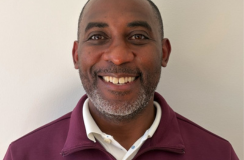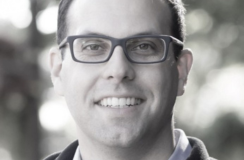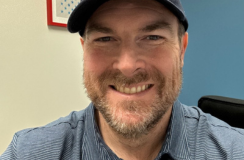harles Barr loves telling people that he owns a plumbing business.
It’s definitely not on the shortlist of things you’d imagine for an MBA business school grad with a background in tech.
He liked the idea of owning a business with an existing customer base and cashflow. But growing a tech startup requires great fundraising skills — which didn’t appeal to Charles. However, as a Warren Buffet and Charlie Munger fan, he didn’t mind looking into “boring” businesses without the price tags of sexier digital ones.
He focused his acquisition search on trade businesses and listened to as many podcasts as he could about the kinds of companies he was interested in. He also followed relevant people on Twitter (see the Resources section) and generally absorbed as much information as he could.
Trade businesses were attractive because they are highly fragmented — which meant there was an opportunity to find a company with potential at a relatively low price.
He considered electrical businesses, but ultimately focused on HVAC and plumbing companies within South Florida. HVAC proved to be more competitive. Charles says most of the attractive businesses were under contract by the time he found them.
Eventually his search led him to DiMartino Plumbing, which was making $1.5-$2 million annually with a profit of about $300,000.
Using savings he’d accumulated, Charles purchased the plumbing company for about 3X cashflow.
He liked DiMartino’s residential focus and that the business had a service component that he could grow and optimize.
On this episode of the podcast, he explains why he was attracted to a search fund model (and why he did a self-fund search in the end), what makes plumbing companies attractive for acquisition and the criteria he used when evaluating the business. He also shares his plans for growing a “mini conglomerate” of home services businesses through future acquisitions.
Check out:
✳️ Top takeaways from the episode
✳️ Episode highlights with timestamps

Acquisition Entrepreneur: Charles Barr
💵 What he acquired: An MIT grad (undergrad and business school), Charles spent a few years working in tech before deciding that he wanted to own a business in the trades. After studying up on other small business acquisitions — mostly from podcasts — Charles acquired West Palm Beach, Florida-based DiMartino Plumbing in July 2021 for about 3X seller discretionary earnings. He paid cash.
💡 Key quote: “I'm really excited about plumbing. I think it's a really interesting trade. Very importantly, Amazon's not going to kill you. The economics are good. It's technical. So there are a lot of reasons to go for a plumbing company.”
👋 Where to find him: Twitter | LinkedIn

Acquisition Tips From the Episode
Top takeaways from this conversation
🔎 A proprietary search might not be the best use of your time.
When looking to acquire a business, Charles pursued many avenues, including brokerages and online platforms. When he found a business he thought was attractive, he reached out to the owner to start a dialogue about a potential acquisition.
“The problem with that is you're talking to a lot of people who are not interested in selling at all,” he says. “So I believe my time was better spent looking at businesses that were definitely for sale.”
💰 A search fund provides a path for investors to finance your business search, but it has its limitations.
Initially Charles was interested in pursuing a search fund where investors put in around $250,000 to finance the search for a business over a two-year period. He ultimately decided to conduct a self-funded search for three reasons:
- He didn’t want to feel pressured into buying a business to make investors feel like they were getting a return on their investment
- Investors aren’t generally interested in searches in limited geographic areas (and Charles knew he wanted to buy a business in South Florida)
- Adding investors raises the stakes — you’ll have to spend more money for the deal to make sense (dividing a $500,000 business among 10 people doesn’t work)
👨 When Charles was looking to buy a plumbing company, DiMartino was attractive because it had an existing service component — an aspect of the business that could grow and be optimized.
One reason why Charles chose to acquire vs. start a business from scratch has to do with his skill set — he’s good at growth and optimizing customer service. Once he decided to focus on plumbing, he liked that about 50% of DiMartino’s business was focused on service rather than construction.
Service projects are smaller and less complex than major construction projects, which means there’s more potential for growth. DiMartino also focuses on residential jobs, which was Charles’ preference: “There's some complexities with commercial work that I don't want to embark on,” he says, adding that some property managers are incentivized to save money on projects, which results in a race to the bottom.
Episode Highlights
Inflection points from the show
[1:52] From MIT to plumbing business: Charles studied economics and political science at MIT. He learned Python and SQL and worked in tech startups before going to business school. Eventually, he decided he wanted to own a business and talks about how he stumbled across plumbing on Twitter.
[4:18] Turning away from tech: Though he worked in tech for a while, Charles ultimately went in a different direction. He didn’t stick with tech for a few reasons, including that he didn’t see himself as a skilled fundraiser and didn’t like the idea of not making money in the near term.
[6:09] Starting vs. acquiring a plumbing biz: Buying a plumbing business gives you access to systems, customers and a reputation — but it’s not cheap. Ultimately Charles decided to acquire (rather than start one) because he thinks it could be a better fit with his skills.
[12:07] The podcast MBA: Charles did a lot of research on industry dynamics by listening to podcasts. He was “industry agnostic” while studying up on different kinds of businesses.
[15:21] On picking a biz for purchase: Charles talks about the reasons he went with DiMartino Plumbing, including the fact that the company had an existing service component — and area where he saw growth potential.
[19:15] The search: When looking to purchase, Charles tried all the different avenues — he looked at listings online like Biz Buy Sell, spoke to brokers and even approached owners directly. Ultimately he realized his time was better spent looking at businesses that were already for sale.
[23:56] Search fund specifics: Originally Charles was interested in pursuing a search fund (where investors fund the time it takes to find a business for purchase); he talks about why he elected to do a self-funded search instead.
[29:51] DiMartino P&L: DiMartino grosses around $1.5-$2 million in revenue annually with approx. $300,000 in SDE. Charles purchased the plumbing company (in cash) for about 3X cashflow.
[30:40] Plumbing biz buyer beware: Stay away from businesses that count PPP loans as revenue — Charles says he came across that a few times. He shares other attributes he looked for when making a purchase like ensuring the business had a good reputation.
[38:33] Is a sweaty startup worth it?: After owning his plumbing business for less than 45 days, Charles describes the hard work that is involved with owning a business that doesn’t operate primarily online, but still feels there can be a high-probability of success if you know your strengths.
[41:30] Coulda, woulda, shoulda: Charles reflects on his acquisition and says he would have liked to do some pre-hiring and brought in a right-hand man.
[44:55] On to the next acquisition: Charles aspires to own a “mini conglomerate.” He hopes to make his next purchase within the next 12 to 18 months. He’s open to another plumbing business, but is also interested in adjacent businesses in what he calls the “home services space.”
[51:02] Buy small, win big: Detractors say buying a small business like DiMartino is like buying yourself a job. Charles says that’s true in the short-term, but if you grow the business and build systems, things change and the payoff can be large.










%20-%20thumbnail.png)






%20-%20thumbnail.png)



%20-%20thumbnail.png)

.png)




%20-%20thumbnail.png)















%20-%20thumbnail.png)































































